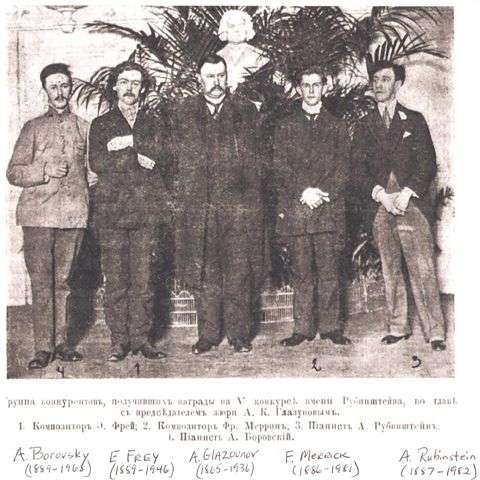Anton Rubinstein Competition
The Anton Rubinstein Competition is the name of a music competition that has existed in two incarnations. It was first staged in Russia and Western Europe between 1890 and 1910, and prizes were awarded for piano playing and composition. Since 2003 it has been run in Germany as a piano competition only.

Original competition
The original Anton Rubinstein Competition was staged by Anton Rubinstein himself in 1890.[1] Two prizes of 5000 francs were awarded to the winners in composition and piano. Winners include:
- 1890 (St. Petersburg): Nikolay Dubasov, piano; Ferruccio Busoni, composition (Concert Piece for Piano and Orchestra, Op. 31a)
- 1895 (Berlin): Josef Lhévinne, piano; Henryk Melcer-Szczawiński, composition (Konzertstück, Piano Trio)
- 1900 (Vienna): Émile Bosquet, piano;[2]Alexander Goedicke, composition
- 1905 (Paris): Wilhelm Backhaus, piano. Béla Bartók took second prize. Composition Prize not awarded.
- 1910 (St. Petersburg): Emil Frey, composition prize (Piano Trio), diploma to Frank Merrick; Alfred Hoehn, piano (Artur Lemba was a piano finalist)
According to The Musical Times of October 1, 1910, the Fifth International Competition for the Rubinstein prize commenced on August 22. Two prizes of 5,000 francs were offered, for composition and for piano playing. The two successful competitors were both German musicians - Emil Frey (as composer; he was actually Swiss) and Alfred Hoehn, professor at the Hoschsche Konservatorium in Frankfurt (as pianist; he was actually Austrian). Diplomas for excellence in piano playing were awarded to Arthur Rubinstein, Emil Frey and Alexander Borovsky. The Board of Examiners consisted of only Russian musicians. Alexander Glazunov, Chairman of the Jury, presented the awards.
The first prize for pianists graduating from Saint Petersburg Conservatory was named after Rubinstein as well; Maria Yudina recalled that she and her classmate Vladimir Sofronitsky had won the prize in 1920.[3]
Revived competition
Since 2003, the "Anton G. Rubinstein" International Piano Competition has been revived in Dresden, Germany. Winners include:
- 2003:

- 2005:

- 2007:

- 2009:

- 2012:

 Participants in the 1910 Anton Rubinstein Piano Competition in St. Petersburg, Russia. Seated at far left Alexander Borovsky
Participants in the 1910 Anton Rubinstein Piano Competition in St. Petersburg, Russia. Seated at far left Alexander Borovsky Judges 1910 Anton Rubinstein Piano Competition in St. Petersburg, Russia
Judges 1910 Anton Rubinstein Piano Competition in St. Petersburg, Russia
References
- "Archived copy". Archived from the original on 2007-09-28. Retrieved 2009-03-24.CS1 maint: archived copy as title (link)
- Koninklijk Vlaams Conservatorium Antwerpen 1898 - School, Conservatorium, Hogeschool - 1998, Traditie en vernieuwing Hogeschool Antwerpen Departement Dramatische Kunst, Muziek en Dans, 1998. Desguinelei 25, B 2018 Antwerpen. ISBN 90-804285-1-5. D 1998/3370/1 (English translation) Royal Flemish Conservatory of Antwerp 1898 - School, Conservatory, Graduate School -1998, Tradition and renewal. Graduate School of Antwerp, Department of Theater, Music and Dance, 1998. Desguinelei 25, B 2018 Antwerp. ISBN 90-804285-1-5. D 1998/337/1
- "Archived copy". Archived from the original on 2008-10-21. Retrieved 2007-03-01.CS1 maint: archived copy as title (link)
- "Archived copy". Archived from the original on 2013-03-16. Retrieved 2013-07-06.CS1 maint: archived copy as title (link)
- "Archived copy". Archived from the original on 2014-12-21. Retrieved 2016-02-05.CS1 maint: archived copy as title (link)